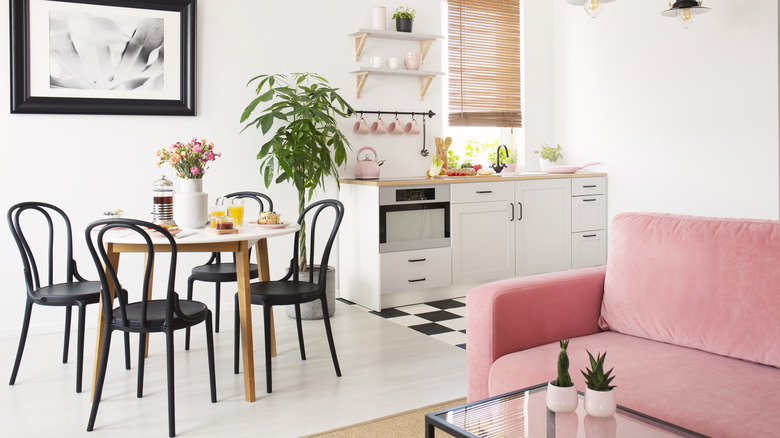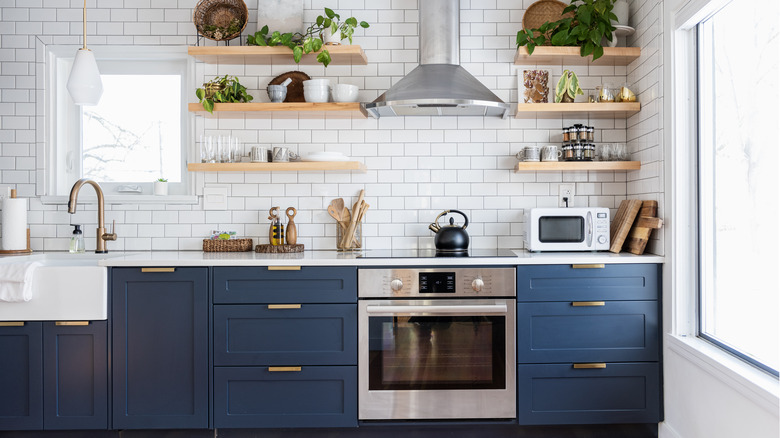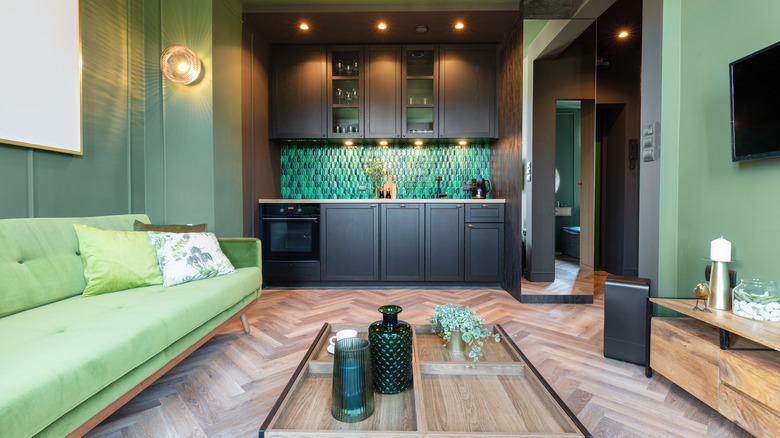What's The Exact Difference Between A Kitchen And A Kitchenette?
Matching your living space to your lifestyle is crucial for a happy home life, and if you've ever searched for an apartment, browsed Airbnb for a vacation rental, looked into remodeling your own house, or outfitted a personal space for a family member who's moving in, you've undoubtedly heard the terms "kitchen" and "kitchenette" used pretty frequently. The latter is smaller than the former, sure, but what's the actual difference in technical terms?
Although there are numerous differences, they're all related to one factor: Size. While kitchens are considered to be separate rooms that have more than 80 square feet, kitchenettes are typically spaces of less than 80 square feet that are usually installed in part of another area in the house, such as in the living room. Kitchenettes will, for example, sit along one wall of a studio apartment, or feature a free-standing counter that separates a larger living space.
It's that lack of space that leads to other differences: Kitchenettes tend to have smaller and fewer appliances and less options for storage, and while it might seem like those are pretty notable inconveniences to have to deal with, it's not all bad news. Kitchenettes might be exactly the sort of low-maintenance, easy-to-clean option you're looking for. On the other hand, if you're a home chef who loves to make large or complicated meals, if you love to prep meals in advance, or if you can't do without your gadgets, a kitchen would be the way to go.
A smaller kitchenette means taking space restraints into consideration
When looking at the differences between kitchens and kitchenettes, almost all of those differences are related to space. The smaller footprint of a kitchenette means that you're not going to have as much counter space, which means a smaller work area, and no room for multiple small appliances. You might be able to leave a coffee maker, stand mixer, food processor, and blender on the counter of a kitchen, but in a kitchenette? Not so much.
When it comes to other appliances, you'll often find miniature versions in a kitchenette. That means a narrow dishwasher, a stove with only a few burners, and a narrow oven (if you even have one at all). Plus, they often have smaller refrigerators that — in some cases — can all be built into or around a countertop unit, and rely on two-in-one appliances, like a combination air fryer and toaster oven. If you prefer more space, full-sized appliances, and counter space to work, a kitchen is a better option. Love rolling out dough, then baking cookies and pies? That's tough in a kitchenette.
Another drawback to a kitchenette can be a lack of storage. For anyone who likes to buy in bulk to save money, or make large batches of your favorite comfort foods to freeze and reheat later, a kitchenette isn't going to have the kind of space you're likely to need. Cabinet, cupboard, fridge, and freezer space are all at a minimum, but depending on your lifestyle, that smaller space might be perfect.
There are some major benefits to kitchenettes
Space constraints of a kitchenette might make it seem like kitchens are better, right? Not so fast. If you're the type who knows that it pays to shop at a farmers market every weekend, not having a massive fridge isn't going to bother you. You may also never use small appliances, eat only fresh food and not need freezer space, or want to make the most of the small space of a condo. In that case, you'll look to the space-saving kitchenette.
That lack of space can also work to your benefit. If you tend to clutter your living space with stuff you never end up using and then regret the inevitable chaos, streamlining your area into a kitchenette can help you rethink what you really need and encourage you to be more organized. It'll also help you to clean as you go and avoid major messes, and that smaller space means less cleaning than you would have to manage in a full kitchen.
Aside from a difference in space, there are a few other fundamental differences here. Because they're smaller and easier to clean, they can actually be beneficial to those with allergies to things like dust. Kitchenettes are also much more cost-effective, and consider this: When kitchenette appliances — like that smaller fridge — need to be replaced, you can do so at a fraction of the price. Those, however, might not matter to you. Kitchen or kitchenette? It's all about lifestyle and preference.


